Hyundai i30 vs Hongqi HS5 – Which one offers the better deal?
Compare performance, boot capacity, efficiency and price at a glance.
Find out which car is the better choice for you – Hyundai i30 or Hongqi HS5?
Costs and Efficiency:
When it comes to price and running costs, the biggest differences usually appear. This is often where you see which car fits your budget better in the long run.
Hyundai i30 has a significantly advantage in terms of price – it starts at 24000 £, while the Hongqi HS5 costs 36000 £. That’s a price difference of around 12004 £.
Fuel consumption also shows a difference: Hyundai i30 manages with 5.70 L and is therefore convincingly more efficient than the Hongqi HS5 with 9.50 L. The difference is about 3.80 L per 100 km.
Engine and Performance:
Power, torque and acceleration say a lot about how a car feels on the road. This is where you see which model delivers more driving dynamics.
When it comes to engine power, the Hongqi HS5 has a evident edge – offering 218 HP compared to 140 HP. That’s roughly 78 HP more horsepower.
In acceleration from 0 to 100 km/h, the Hongqi HS5 is a bit quicker – completing the sprint in 8.70 s, while the Hyundai i30 takes 9.60 s. That’s about 0.90 s faster.
In terms of top speed, the Hongqi HS5 performs barely noticeable better – reaching 204 km/h, while the Hyundai i30 tops out at 197 km/h. The difference is around 7 km/h.
There’s also a difference in torque: Hongqi HS5 pulls distinct stronger with 340 Nm compared to 253 Nm. That’s about 87 Nm difference.
Space and Everyday Use:
Whether family car or daily driver – which one offers more room, flexibility and comfort?
Both vehicles offer seating for 5 people.
In curb weight, Hyundai i30 is clearly perceptible lighter – 1291 kg compared to 1805 kg. The difference is around 514 kg.
In terms of boot space, the Hyundai i30 offers significantly more room – 395 L compared to 0 L. That’s a difference of about 395 L.
When it comes to payload, Hyundai i30 to a small extent takes the win – 509 kg compared to 450 kg. That’s a difference of about 59 kg.
Who wins the race?
The Hyundai i30 proves to be leaves the rival little chance and therefore becomes our DriveDuel Champion!
Hyundai i30 is the better all-rounder in this comparison.
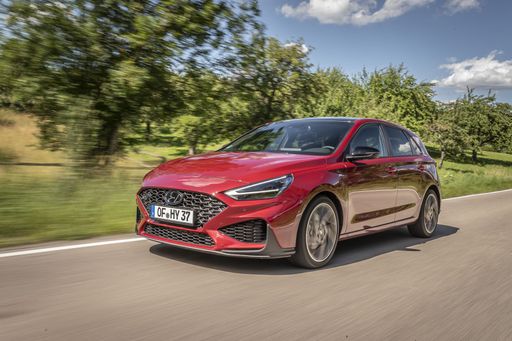
Hyundai i30
Hyundai i30
The Hyundai i30 stands out in the hatchback segment with its sleek design and modern features. It offers a comfortable ride with a well-crafted interior that caters to both driver and passengers. With its emphasis on safety and technology, the i30 provides a balanced driving experience suitable for urban and suburban environments.
details @ hyundai.news
@ hyundai.news
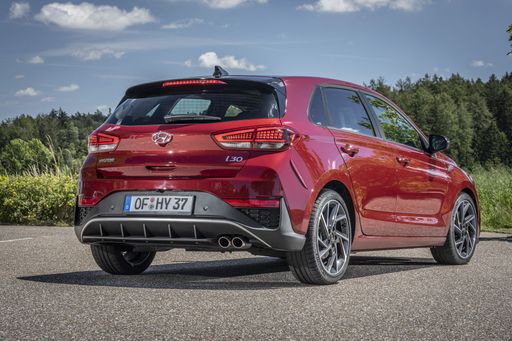 @ hyundai.news
@ hyundai.news
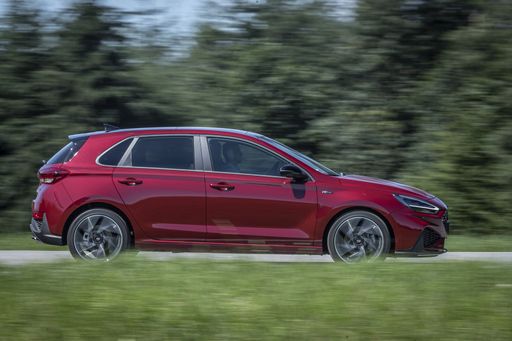 @ hyundai.news
@ hyundai.news
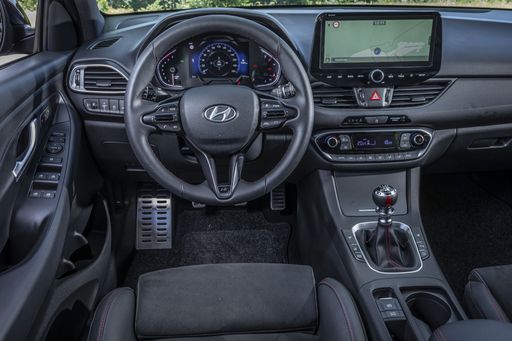 @ hyundai.news
@ hyundai.news
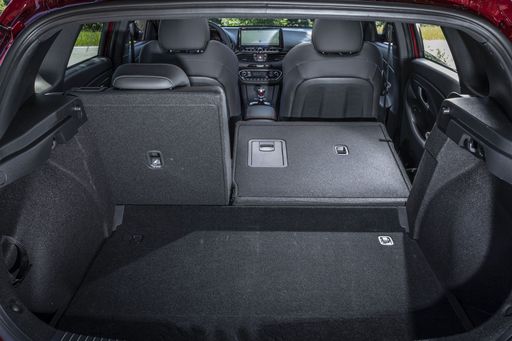 @ hyundai.news
@ hyundai.news
Hongqi HS5
The Hongqi HS5 exudes a sense of luxury and sophistication, combining elegant design with a comfortable and high-quality interior. As part of Hongqi's pursuit of excellence, this SUV offers a refined driving experience characterized by smooth handling and advanced technology features. With its striking presence on the road, the Hongqi HS5 makes an undeniable statement of style and prestige.
details

|
|
|
|
|
Costs and Consumption |
|
|---|---|
|
Price
24000 - 29300 £
|
Price
36000 £
|
|
Consumption L/100km
5.7 - 6 L
|
Consumption L/100km
9.50 L
|
|
Consumption kWh/100km
-
|
Consumption kWh/100km
-
|
|
Electric Range
-
|
Electric Range
-
|
|
Battery Capacity
-
|
Battery Capacity
-
|
|
co2
130 - 136 g/km
|
co2
240 g/km
|
|
Fuel tank capacity
50 L
|
Fuel tank capacity
64 L
|
Dimensions and Body |
|
|---|---|
|
Body Type
Hatchback
|
Body Type
SUV
|
|
Seats
5
|
Seats
5
|
|
Doors
5
|
Doors
5
|
|
Curb weight
1291 - 1407 kg
|
Curb weight
1805 kg
|
|
Trunk capacity
395 L
|
Trunk capacity
0 L
|
|
Length
4340 mm
|
Length
4760 mm
|
|
Width
1795 mm
|
Width
1907 mm
|
|
Height
1455 mm
|
Height
1700 mm
|
|
Max trunk capacity
1301 L
|
Max trunk capacity
-
|
|
Payload
463 - 509 kg
|
Payload
450 kg
|
Engine and Performance |
|
|---|---|
|
Engine Type
Petrol, Petrol MHEV
|
Engine Type
Petrol
|
|
Transmission
Manuel, Automatic
|
Transmission
Automatic
|
|
Transmission Detail
Manual Gearbox, Dual-Clutch Automatic
|
Transmission Detail
Automatic Gearbox
|
|
Drive Type
Front-Wheel Drive
|
Drive Type
All-Wheel Drive
|
|
Power HP
100 - 140 HP
|
Power HP
218 HP
|
|
Acceleration 0-100km/h
9.6 - 13.1 s
|
Acceleration 0-100km/h
8.70 s
|
|
Max Speed
178 - 197 km/h
|
Max Speed
204 km/h
|
|
Torque
172 - 253 Nm
|
Torque
340 Nm
|
|
Number of Cylinders
3 - 4
|
Number of Cylinders
4
|
|
Power kW
74 - 103 kW
|
Power kW
160 kW
|
|
Engine capacity
998 - 1482 cm3
|
Engine capacity
1989 cm3
|
General |
|
|---|---|
|
Model Year
2024
|
Model Year
2025
|
|
CO2 Efficiency Class
D, E
|
CO2 Efficiency Class
G
|
|
Brand
Hyundai
|
Brand
Hongqi
|
What drive types are available for the Hyundai i30?
Available configurations include Front-Wheel Drive.
The prices and data displayed are estimates based on German list prices and may vary by country. This information is not legally binding.
